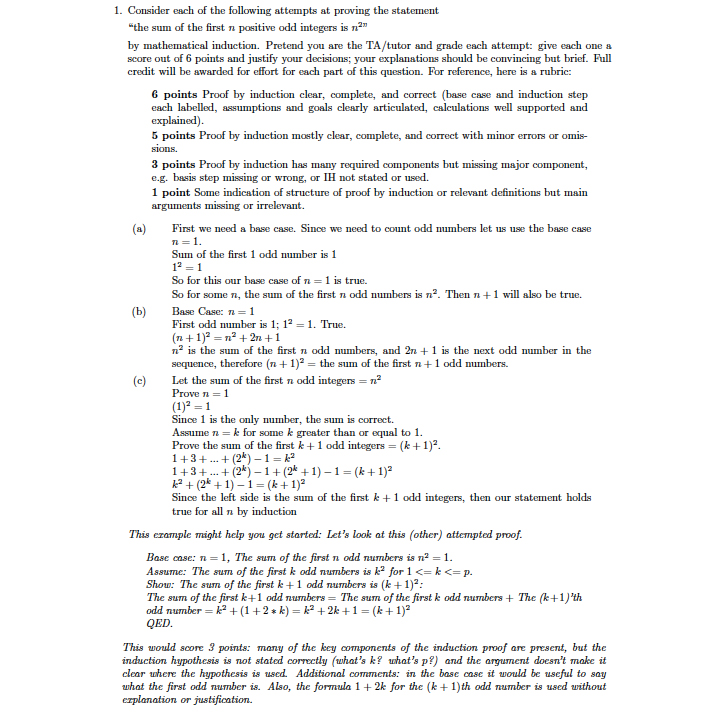Answered step by step
Verified Expert Solution
Question
1 Approved Answer
Consider each of the following attempts at proving the statement the sum of the first n positive odd integers is n 2 by mathematical induction.
Consider each of the following attempts at proving the statement the sum of the first n positive odd integers is n 2
by mathematical induction. Pretend you are the TA/tutor and grade each attempt: give each one a
score out of 6 points and justify your decisions; your explanations should be convincing but brief. Full credit will be awarded for effort for each part of this question. For reference, here is a rubric:

1. Consider each of the following attempts at proving the statement "the sum of the first n pasitive odd integers is2 by mathematical induction. Pretend you are the TA/tutor and grade each attempt: give each one a score out of 6 points and justify your decisions; your explanations should be convincing but brief. Full credit will be swarded for effort for each part of this question. For reference, here is a rubric: points Proof by induction clear, complete, and correct (base case and induction step each labelled, assumptions and goals clearly articulated, calculations well supported and 5 points Proof by induction mostly clear, complete, and correct with minor errors or omis 3 points Proof by induction has many required components but missing major component, 1 point Some indication of structure of proof by induction or relevant definitions but main e.g. basis step missing or wTong, or IH not stated or used arguments missing or irrelevant. (a) First we need a base case. Sinoe we need to count odd numbers let us use the base case Sum of the first 1 odd number is 1 So for this our base case of n 1 is true. So for some , the sum of the first n odd numbers is n2. Then 1 will also be true. (b) Base Case: a 1 First odd number is 1; 12-1. True. (n1)n2 2n1 n2 is the sum of the first odd numbers, and 2n 1 is the next odd number in the sequence, therefore (n1)2the sum of the first n+1 odd numbers. (c) Let the sum of the first n odd integers2 Prove r1 (1-1 Since 1 is the only number, the sum is correct. Assume nk for some k greater than or equal to 1 Prove the sum of the first k + l odd integers = (k + 1)2 k(21) -1-(k1)2 Since the left side is the sum of the first k +1 odd integers, then our statement holds true for all n by induction This ezample might help you get started: Let's look at this (other) attempted proof Base case: n 1, The sum ofthe first n odd numbers is n2-1 Assume: The sum of the first k odd numbers 18 k2 for 1
Step by Step Solution
There are 3 Steps involved in it
Step: 1

Get Instant Access to Expert-Tailored Solutions
See step-by-step solutions with expert insights and AI powered tools for academic success
Step: 2

Step: 3

Ace Your Homework with AI
Get the answers you need in no time with our AI-driven, step-by-step assistance
Get Started


